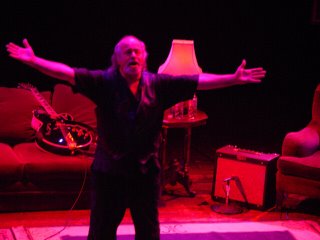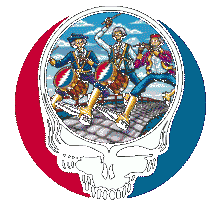Grateful Dead lyricist turns to writing novels

The Journal News:
Grateful Dead lyricist turns to writing novels
By JOHN ROGERS
THE ASSOCIATED PRESS
Robert Hunter laughs at the irony as he turns the image over in his head: The solitary writer, secluded in a cabin, churning out the Great American Novel.
"I'm finally turning into just what they always said I was — a reclusive writer," chuckles Hunter during what turns into a two-hour discussion of his 30 years as the Grateful Dead's principal lyricist, the band's place in history and his newest writing endeavor.
The path from a piano keyboard to a computer keyboard is a recent one.
Asked last spring to compose a foreword to David Dodd's book, "The Complete Annotated Grateful Dead Lyrics," Hunter responded with a lengthy history of his partnership with lead guitarist Jerry Garcia.
"When I got done with that I found I enjoyed writing it so much that I said, 'Hey, let's keep writing,' " he recalled. "I've finished one novel since then and I'm five chapters into another one."
The first book is called "Doppelganger," the name for the twin that, according to mythology, each of us has somewhere in the world. He's waiting on word from his publisher on when it will be released. First, though, he writes on his Web site, "I find I absolutely must rewrite the book from top to bottom because there's so much more to say about the characters."
Though he still plans to tour — promoting the novel — he's happy in the writing cabin he shares with his wife, Maureen, and their teenage daughter, Kate. His voice sounds surprisingly frail as he recovers from dental and knee surgery.
"Frail! I like that word," Hunter says, evaluating the choice. "Yes, that describes it well."
Then he is back to the topic, estimating he will complete his 10th novel "just about the time I turn senile."
"And that," he continues, "is a very motivating thing for me at age 64, watching the speed at which the memory and the cognitive functions disintegrate. It's a great incentive for using the time maximally."
Then he catches himself: "Maximally. That's not a good word. I wouldn't write it."
Words have been Hunter's passion since one day in 1949 when, in a brilliant flash, he discovered the world around him and his place within it "as a character in time." Early music influences included Pearl Bailey, Bessie Smith and Josh White, as well as whatever he heard on his parents' radio. Later, he added Woody Guthrie, the operettas of Gilbert and Sullivan and the literary works of James Joyce.
"Sometimes, when I start feeling less than humble, I look at Joyce again and he puts me right in my place," Hunter says.
"I probably just always had some conceited belief that it would," he says.
Known for lyrics with a dramatic flair, Hunter was likely as responsible for the band's success as any of the musicians who sang his words, says Steve Silberman, co-author of the encyclopedic Grateful Dead source book, "Skeleton Key."
"I believe the Grateful Dead would have inspired much less of an emotional loyalty in their fans without his lyrics," Silberman says. "Robert Hunter really located a traditional sense of character and story line found in English literature and childhood ballads ... and placed it in the heart of the weirdest, most experimental music that mass audiences ever fell in love with."
While Garcia traveled the world for 30 years as the Grateful Dead's unofficial front man, Hunter never joinedthe group on stage. He preferred the occasional solo concert in some small place. He also recorded several albums of his own and published several volumes of poetry.
Now, however, he has cast much of that aside to concentrate on novel writing.
"I know my time is dwindling, and I know more at this age," he says. "I don't think I could have written these novels 10 years ago."



0 Comments:
Post a Comment
<< Home